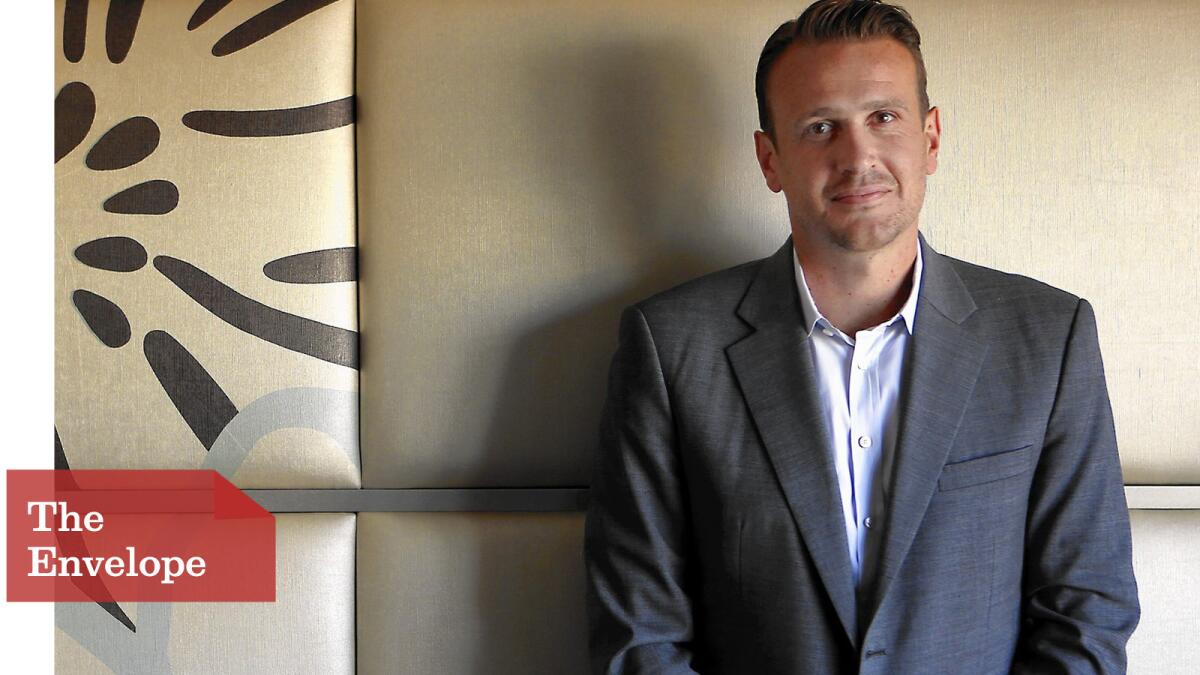The Envelope: Jason Segel as David Foster Wallace? The actor knows it’s ‘not a normal choice’

Jason Segel, who plays David Foster Wallace in “The End of the Tour,” saw a bravery and a politeness in the “Infinite Jest” author.
- Share via
Why did James Ponsoldt select Jason Segel to play David Foster Wallace, one of the most acclaimed novelists of the late 20th century, for “The End of the Tour”? In hindsight, the star of R-rated comedies such as “I Love You Man” and the decade-defining TV show “How I Met Your Mother” understands how odd it all must seem.
“This is not a normal choice. It’s not an obvious choice,” Segel says of starring in the summer release. “But I think that when somebody steps up for you in that way and says ‘I believe you can do this,’ you are then really motivated to pull it off.”
SIGN UP for the free Indie Focus movies newsletter >>
Heralded as the voice of a generation thanks to the acclaim and popularity of his 1996 novel “Infinite Jest,” it wasn’t until the publication of Rolling Stone journalist David Lipsky’s book “Although of Course You End Up Becoming Yourself,” following Wallace’s death, that the writer’s fans were truly able to gain some real insight into the personal life of their literary hero. Lipsky’s chronicle of their five-day road trip at the end of Wallace’s “Jest” book tour is the basis for the film that finds Jesse Eisenberg on board as the onetime music magazine reporter.
In their initial meeting about the project, Ponsoldt told Segel that every time he’d seen him perform, even when in a comedy, he saw sadness in his eyes. The director’s gut instinct to cast the 35-year-old actor and screenwriter paid off as Segel’s performance earned rave reviews following “Tour’s” 2015 Sundance Film Festival premiere and the film’s arrival in theaters in late July.
As you might guess, Segel took the responsibility of playing Wallace quite seriously. He not only paid close attention to the hours of recordings Lipsky made during their extended interview but committed to reading the 1,079-page “Jest” before production began. It was a 10-week process, aided by a Sunday reading group thanks to a few volunteers from his local bookstore.
“There’s something really brave to me about David Foster Wallace and his writing and speeches he’s given. He’s saying, ‘Hey, I feel these ways and I don’t think I’m alone in this and I would like to start a discussion,’” Segel reflects. “It’s like the guy sending out this beacon saying, ‘I don’t feel good and I am curious if other people feel this way as well. And, if so, let’s talk about it.’”
For all Wallace’s literary fame, Segel discovered that the writer was very Midwestern in his temperament, a politeness that also informed his view of the world. Segel notes, “I think sometimes that can probably be in conflict with being smart enough to know everyone’s agenda at a table.”
And that in particular is the essence of Segel’s characterization. Years before he wrote “Jest,” Wallace checked himself into an institution and was placed on suicide watch. He dealt with rumors of suspected heroin abuse, something that had already been reported by another outlet before Lipsky’s interview and, according to the movie, a subject the reporter had been instructed to grill him on. Segel believes Wallace knew this was the elephant in the room and was the one thing he tried to carry throughout the movie, noting, “This is a guy who was acutely aware that anything that happens could go in Rolling Stone.”
Toward the end of the three days, Wallace’s polite demeanor cracks by what Segel believes was the author’s frustration over being asked about this sensitive subject matter. Lipsky realizes he’s misjudged the best way to interview his subject until Wallace makes a surprise late-night visit to his room. In this climactic scene Segel smartly doesn’t play Wallace as an angry man but as someone exasperated that his peer wouldn’t give him time to craft the beautifully written answer he needs for his story.
Segel reflects, “I think that last moment as David Foster Wallace, it’s his chance to communicate the truth to [Lipsky]. His truth, you know? But also say, ‘Look what you missed. You could have had four days of this if you had just stopped asking me what it’s like to be famous.’”
Whether or not Segel makes a mark on the upcoming awards season, the experience of making “Tour” has given him the confidence to embrace his obvious creativity moving forward.
“I look back at the things that I’m most proud of and some of them masquerade as mainstream, but ‘Forgetting Sarah Marshall’ ends with a lavish Dracula puppet musical,” Segel says. “No, that wasn’t successful because it was a romantic comedy. That was successful because it’s like weird and interesting and unique. And it’s kind of zeroing in on what is actually my taste. That’s been a really important thing for me.”
More to Read
Sign up for The Envelope
Get exclusive awards season news, in-depth interviews and columnist Glenn Whipp’s must-read analysis straight to your inbox.
You may occasionally receive promotional content from the Los Angeles Times.








